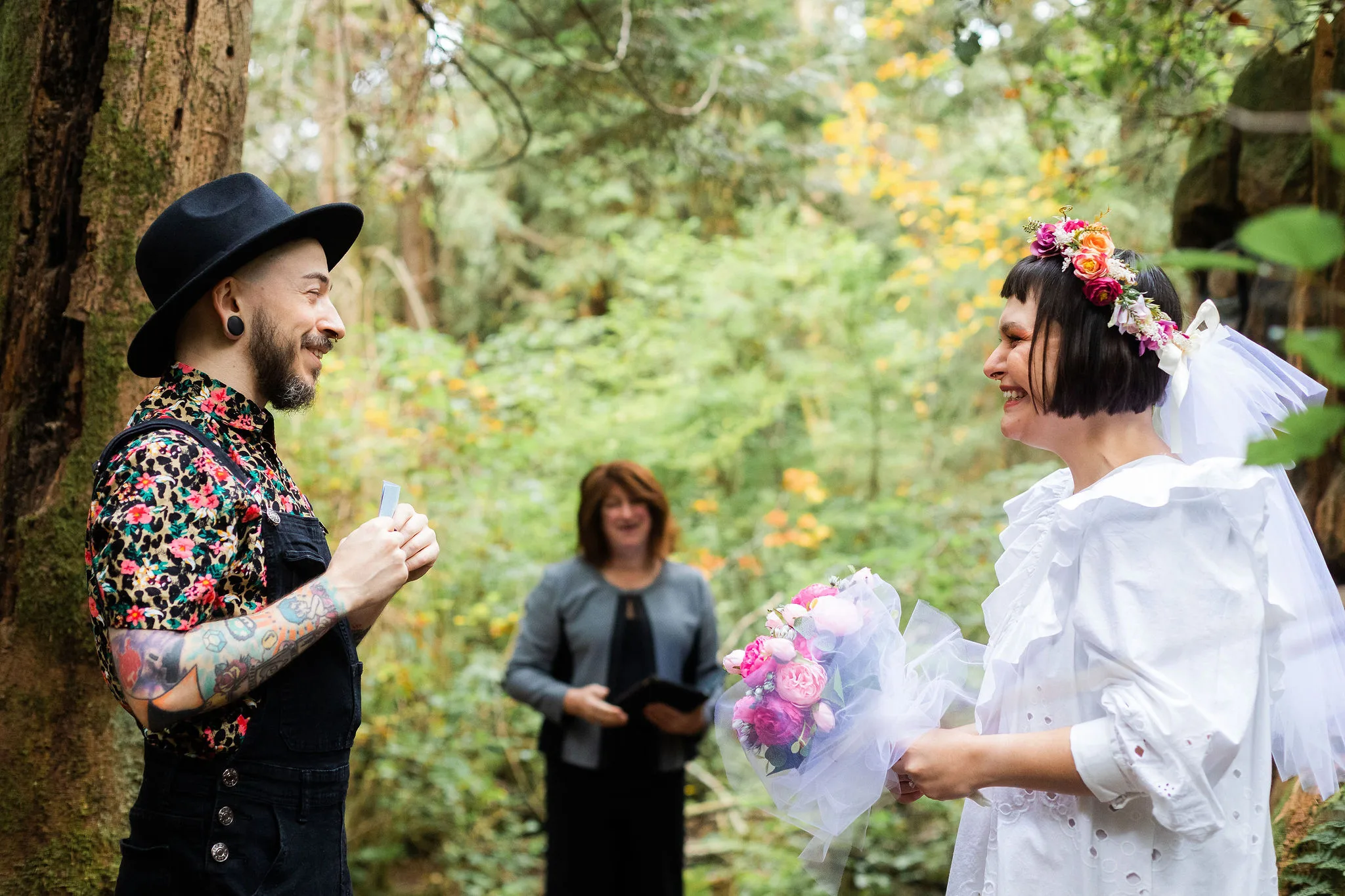As wedding officiants who lead hundreds of ceremonies every year, we know a thing or two about wedding vows! In fact, we literally wrote the course on vows.
Gone are the days when every couple getting married would simply recite traditional, religious vows. These days couples are writing their own personal vows, getting inspired by vows found in literature or movies, printing their vows in beautiful wedding vow booklets, or opting for simple wedding vows that just get to the point. Some couples are even planning to skip the vows at their ceremony (more on that later!).
But what are the different types of vows and different ways to say them? Keep reading to find out!
For everything you’ve ever wanted to know about wedding vows, check out this ultimate guide!
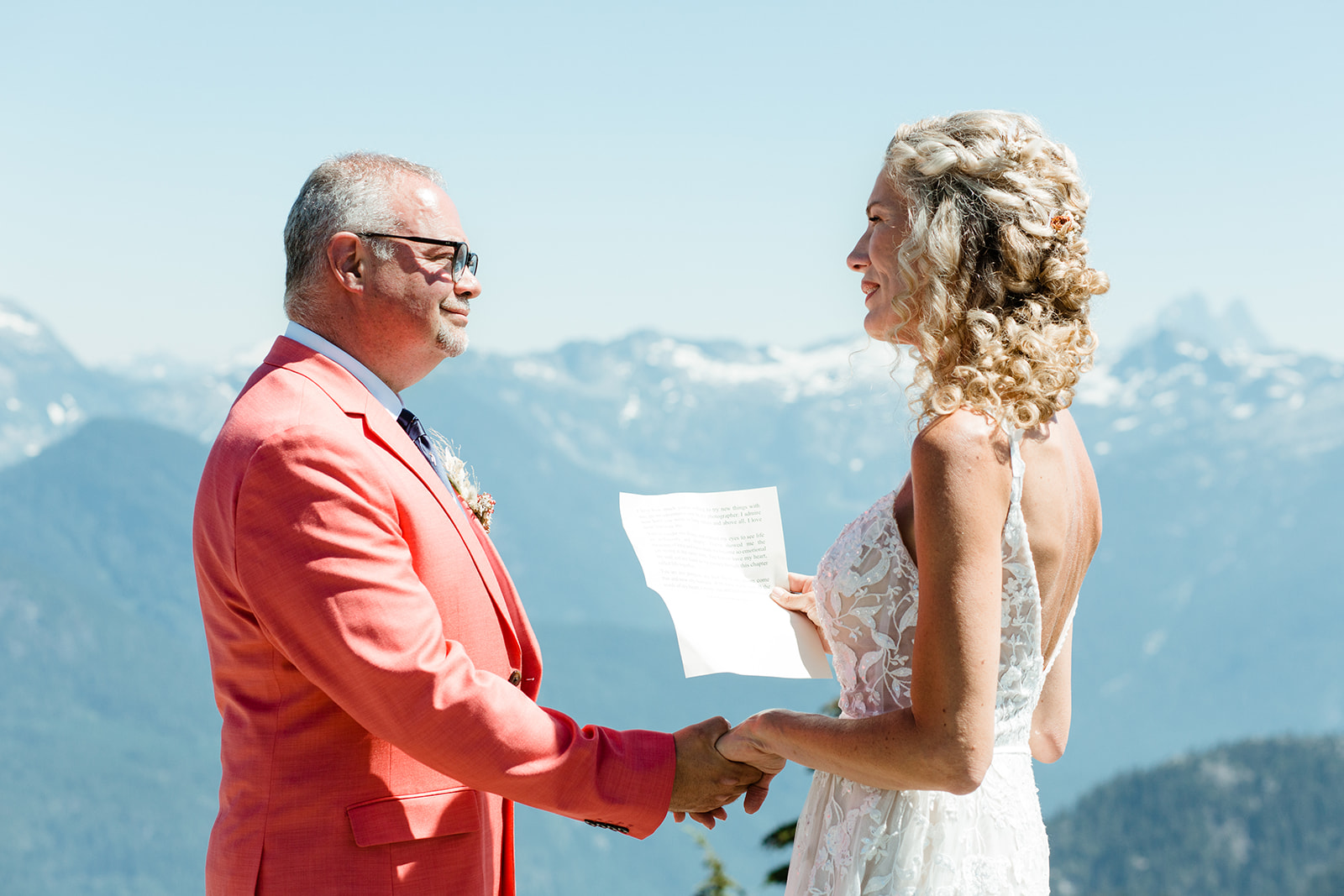
The 3 different types of wedding vows
There are three main types of wedding vows: traditional, personal and a hybrid.
Traditional wedding vows are vows that are pre-written. They’ve been around for hundreds or even thousands of years and usually are heard in religious weddings. For examples, check out The Top 20 Traditional Wedding Vows.
Personal wedding vows are vows that the couple writes themselves. While it may sound intimidating, we promise that writing your own personal vows (and hearing the ones your partner writes for you) will be the most meaningful experience, allowing you to decide what promises you want to make for your marriage. To get started, grab our FREE wedding vow writing guide.
Hybrid wedding vows combine both traditional and personal vows. Instead of sticking to one set of traditional vows and instead of writing your own personal vows from scratch, hybrid vows let you have the best of both worlds. You can mix and match lines and phrases in pre-written vows, while adding in your own style and sentences where needed.
Need some inspiration? Check out 22 Wedding Vows for Any Wedding Ceremony.
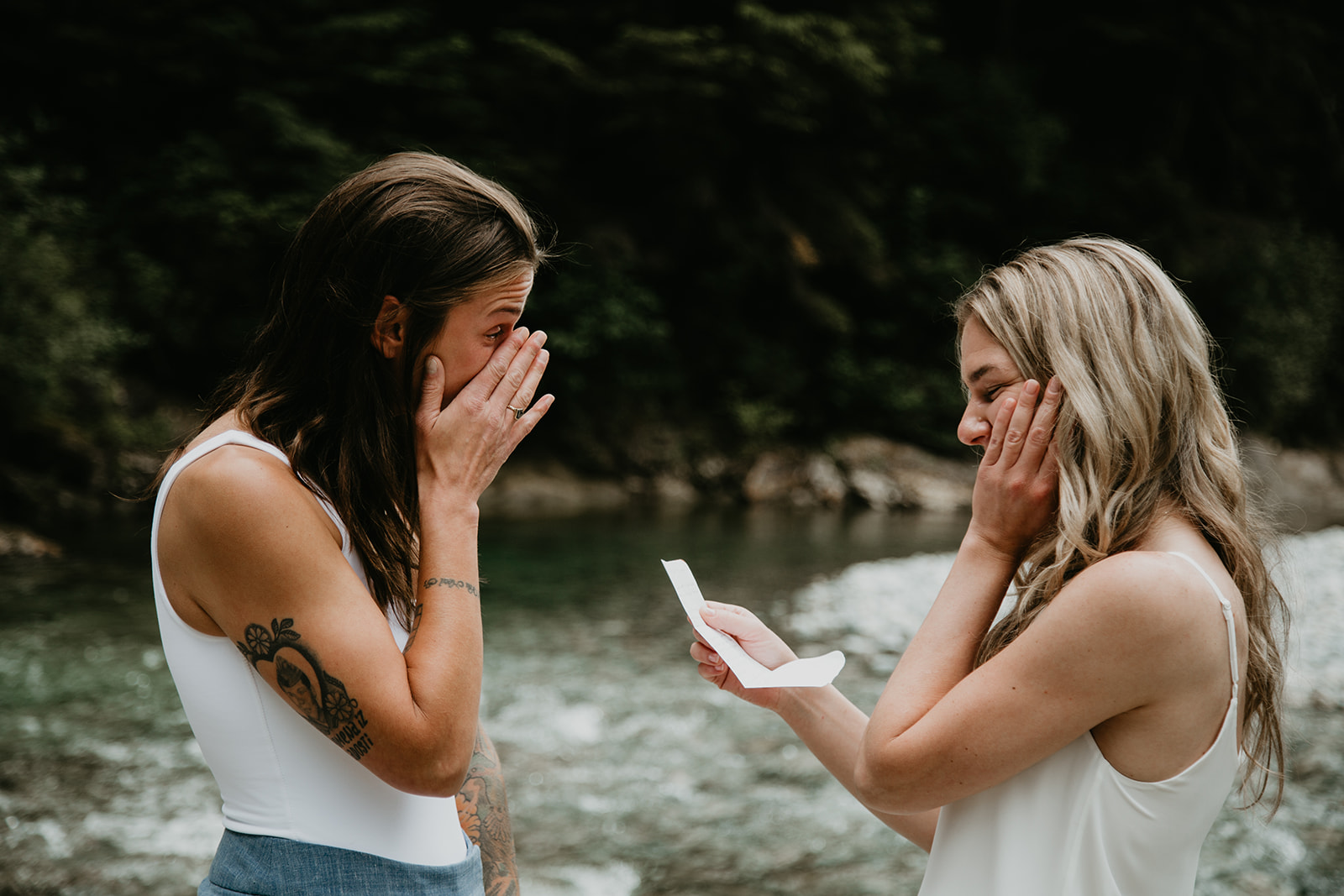
The 5 different ways to say your wedding vows
Now that you know about the three different types of wedding vows, it’s time to dive into how you’ll deliver them. Here are the five main options:
1. Your officiant reads the vows and you say, “I do”
With this option, your wedding officiant will read your vows out loud and you will answer by saying, “I do.” This delivery style works best for traditional vows and in situations where the couple doesn’t want to speak very much during their ceremony. For example:
Officiant: “Do you, Taylor, take Cory as your lawful spouse, to have and to hold from this day forward, for better or for worse, for richer or for poorer, in sickness and in health, until death do you part? If so, please say ‘I do.'”
Taylor: “I do.”
2. Your officiant reads the vows, one line at a time, as you repeat them
Repeating wedding vows allow you to say your own vows, but with the support of your officiant. In this delivery style, you’ll repeat each line of your vows after your officiant. This delivery style is best suited to shorter, traditional vows, as they’ll be said four times (your officiant, you repeating, your officiant again, your partner repeating). For example:
Officiant: “Taylor, please repeat after me. ‘I, Taylor, take you, Cory, as my wedded spouse …'”
Taylor: “I, Taylor, take you, Cory, as my wedded spouse…”
Officiant: “To join with you and share all that is to come…”
Taylor: “To join with you and share all that is to come…”
Officiant: “And I promise to be faithful to you until death parts us.”
Taylor: “And I promise to be faithful to you until death parts us.”
Learn more about repeating vows and see 10 vow examples here!
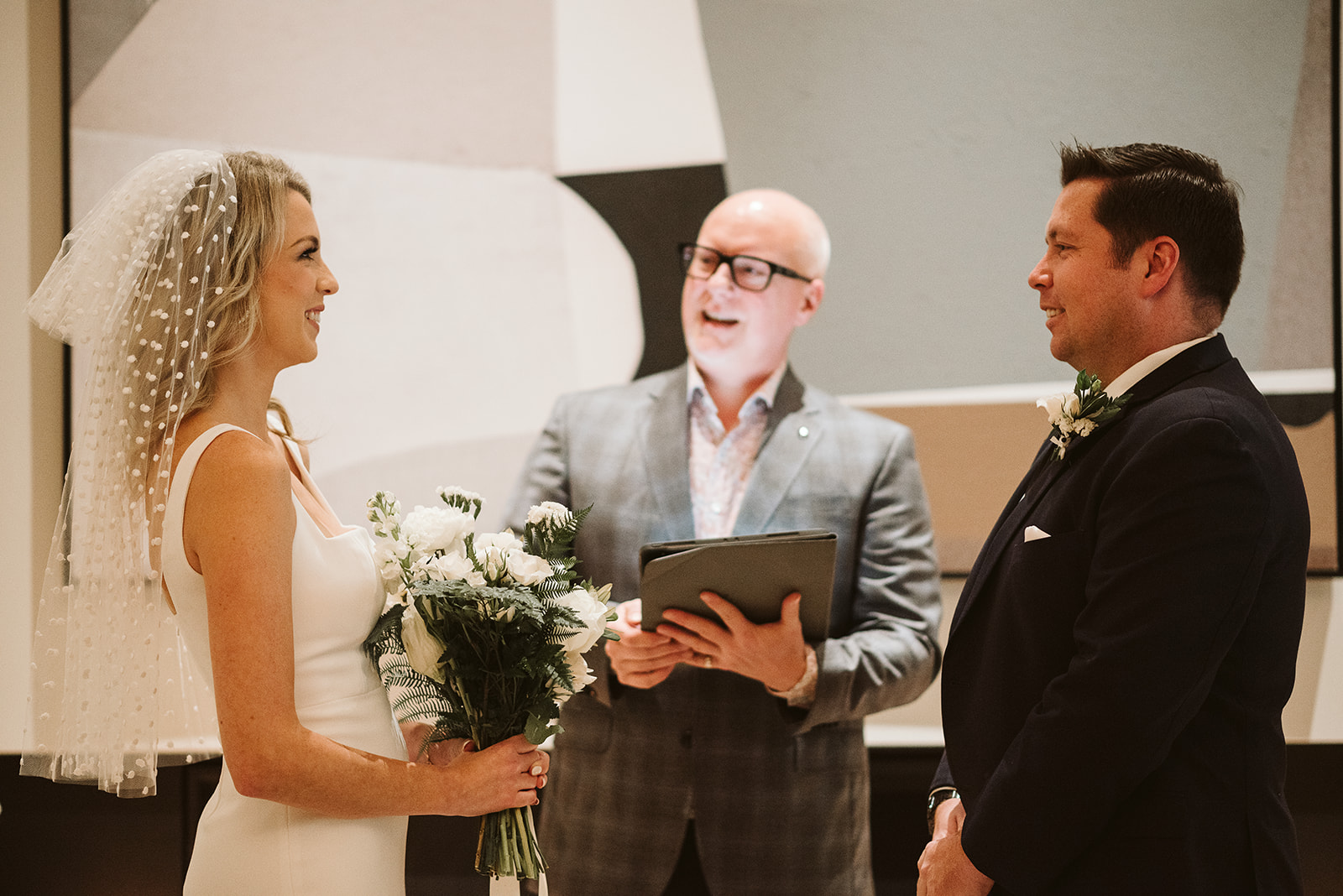
3. You read your wedding vows
This third delivery style is the most personal and, often, most preferable for guests (and couples!). In this style, you will simply read your own wedding vows, usually from a wedding vow booklet or wedding vow book. Since your officiant isn’t needed, they can step to the side and allow you to have a personal moment with your spouse-to-be.
Of course, this delivery style is ideal if you’re writing your own personal vows – who better to read them than you? But this delivery style can also work for traditional or hybrid vows. For example:
Taylor: “Cory, I take you as my spouse, acknowledging and accepting your faults and strengths, as you do mine. I promise to be faithful and supportive, and to always make our family’s love and happiness my priority. I will dream with you, celebrate with you and walk beside you through whatever our lives may bring. You are my person — my love and my life, today and always.”
4. You memorize your wedding vows
While this is technically an option for how you can say your wedding vows, we strongly advise against it! Memorizing your wedding vows (or worse, making them up on the spot!) may seem romantic in the movies but is far from it in real life. By choosing to memorize your vows, you’re adding an extra layer of stress to your wedding day.
Plus, even the best memorizers may find their minds go blank under pressure. The last thing you want is to get to the vows part of your ceremony and realize you’ve completely forgotten your vows and don’t have a back up plan!
If you really want to memorize your wedding vows, go for it. But please still bring a written or printed copy of your vows to your ceremony with you. That way, if nerves get the best of you, you’ll still have the option to read your vows instead of standing there, mouth agape and eyes wide as your guests shuffle uncomfortably and your fiance starts to tear up.
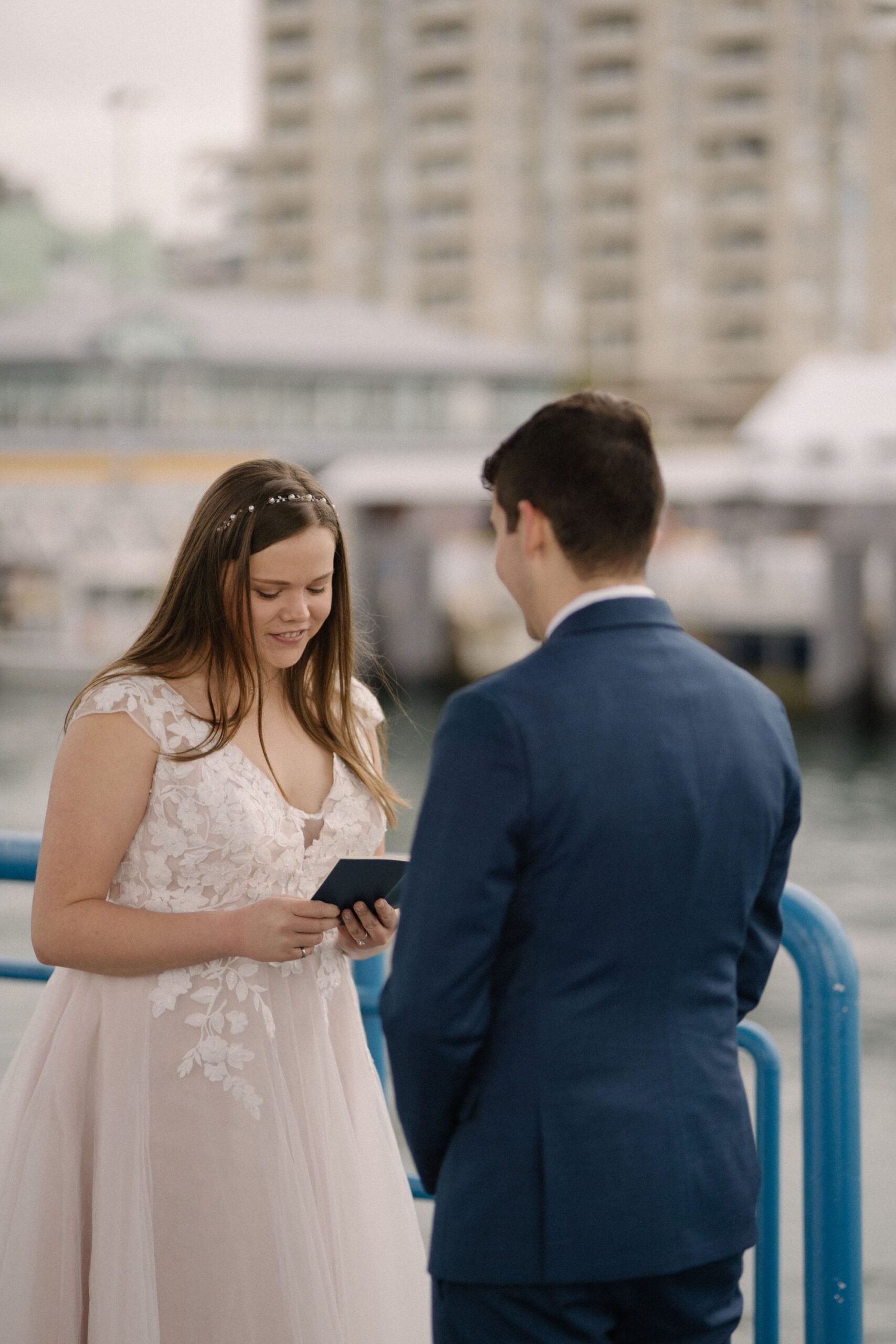
5. You say your personal wedding vows in private
The last option for delivering your vows is to actually say them in private instead of in front of your guests at your wedding ceremony. This option is becoming more and more popular so we’re diving deep into it in the next section!
Do you have to say vows at your wedding ceremony?
Yes and no. Legally, you do need to consent to enter into marriage with one another, usually by saying “I do” after hearing or reciting a short declaration of intent.
However, it’s not mandatory to share your personal vows at your ceremony in front of all of your guests. More and more we’re seeing couples opt to share their wedding vows in private. But is that the right decision?
Pros to sharing your wedding vows in private
- It’s a private moment for just the two of you. Funny enough, it can be hard for couples to carve out alone time on their wedding day. There’s something special about sharing your vows in an intimate moment for just you two.
- There’s less nerves. Because you don’t have to share your wedding vows in front of all of your friends and family, you’ll likely feel less nervous about your ceremony.
- You can still have photos or video of the moment. Even though you’re sharing your vows in private, you can still have your photographer and/or videographer around to capture the memories.
Cons to sharing your wedding vows in private
- You miss out on making your declaration publicly. There’s something so powerful about saying, “Listen up, world! I love this person so much and I want to spend my life with them. Here’s why.” Making your vows in front of your loves ones can be an important moment for you.
- Your ceremony may feel less meaningful. If you cut the vows from your ceremony, you may find that it feels less personal and that you’re less invested, since you’re not speaking any of your own words at your own wedding.
- You may skip the vows altogether. The worst part about opting to share your vows in private is that you may end up not sharing vows at all. If you’re running behind (as weddings often do!) you may end up skipping your moment to share vows or rushing through it. You may even forget to write them since no one will know except you two.
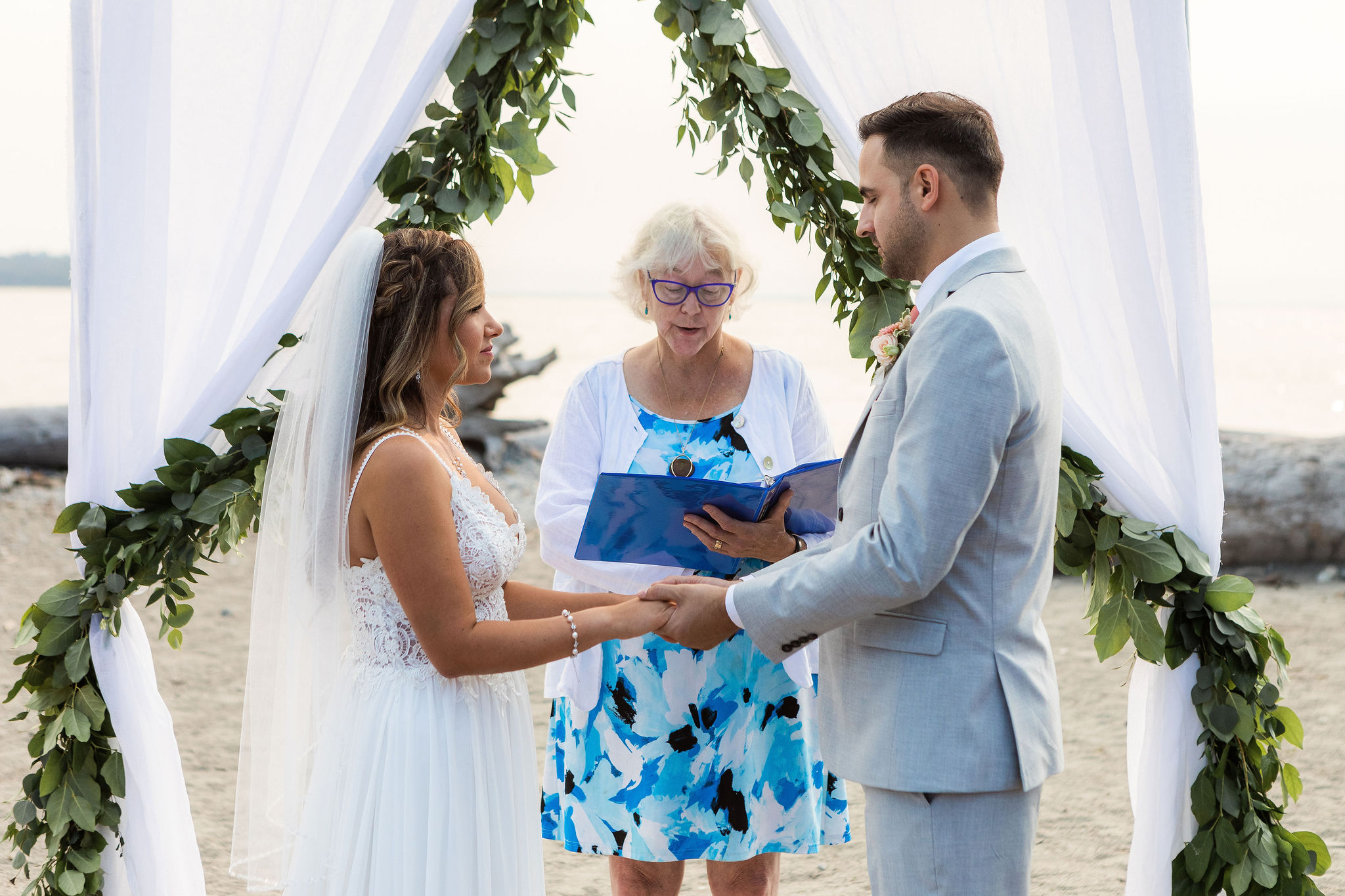
So should you share your wedding vows in private or at your ceremony?
Ultimately, the choice to say your vows in public or in private is up to you. We’ve seen how meaningful it can be to share vows with your partner in front of the people who love you most, declaring to the world your commitment to them. But we also know some couples would prefer a more intimate moment.
Whatever you choose, we do hope you take the time to put your vows together thoughtfully and share them with one another on your wedding day.
If you opt to share your vows in private, we recommend still saying a shortened version at your ceremony. As noted above, this is important for legal reasons: Your officiant needs to hear you both consent to enter into marriage with one another. It’s also an important part of your wedding ceremony, as ceremonies are built around the vows. If you skip them completely, your guests may wonder if you or your officiant forgot!
So even if you opt to say your vows in private, you can still include short and simple wedding vows or a declaration of intent in your ceremony. You can opt for delivery style #1, where your officiant reads the vows and you simply say “I do.” Your wedding officiant can even explain your choice to your guests by saying something like:
Officiant: “Taylor and Cory have written and shared personal vows with each other earlier today, and will now solidify their commitment in front of all of you. Taylor, do you take Cory from this day forward, to join with you and share all that is to come, and promise to be faithful to them until death parts you? If so, please say ‘I do.'”
Taylor: “I do.”
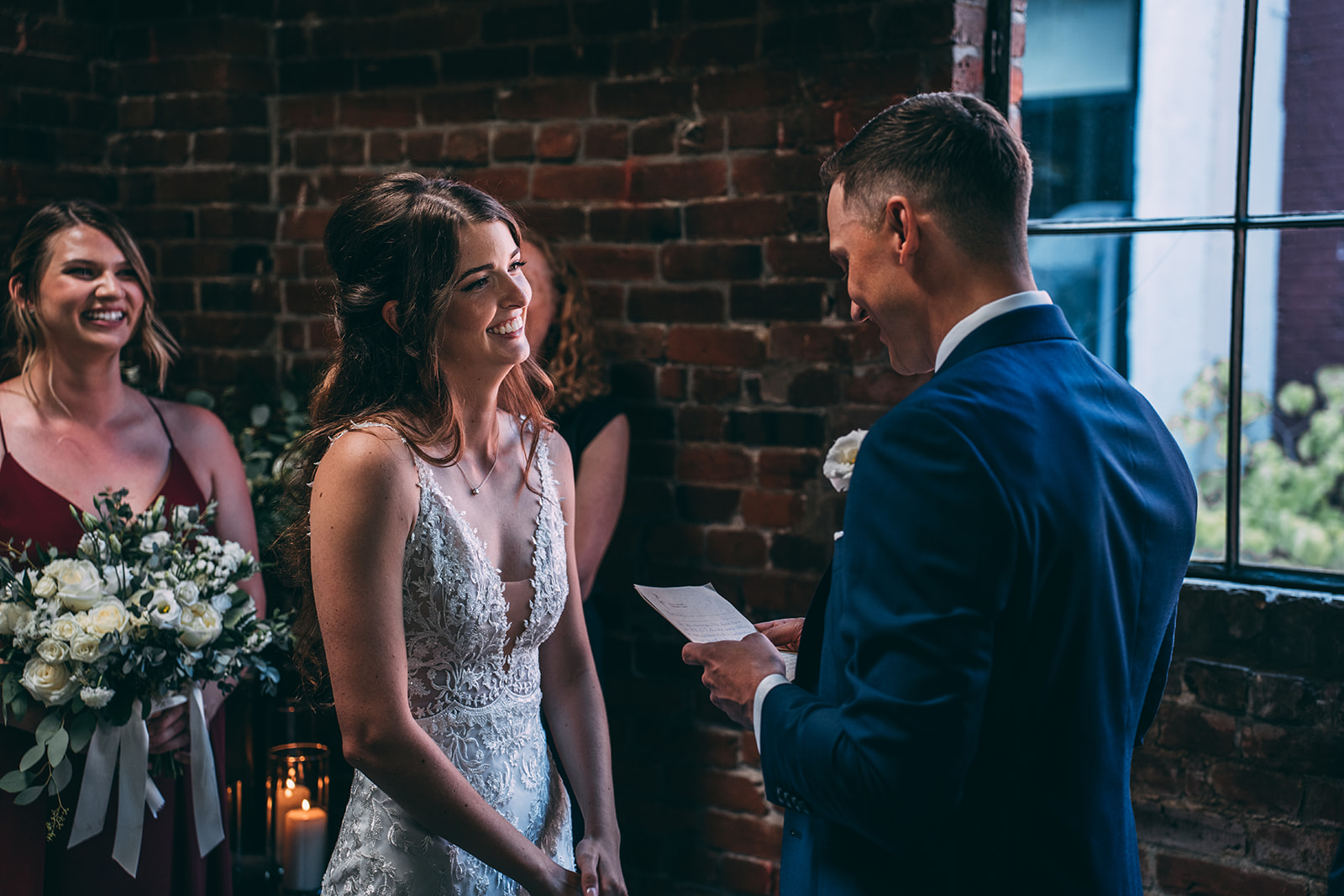
Which wedding vow delivery style should you choose?
Let’s recap: There are three different types of wedding vows (traditional, personal and hybrid) and five different ways to deliver them (officiant reads, you repeat after your officiant, you read, you memorize or you say in private). But which type and style works best for you?
Of course, there is no one right answer – each couple is going to make the choice that works best for them. While we strongly believe that writing your own personal vows and delivering them in front of your closest friends and family is the best way to start your marriage and add meaning to your ceremony, we know it’s not for everyone. However, if you think it could be for you with a little help, check out our vow writing course!
If you’re opting for personal vows, we believe they sound best when read by you. It can be a little awkward for your officiant to say, “I still remember our first date and the way I looked in your eyes.” It’s always better coming straight from the author!
If you’re opting for repeating vows (where your officiant reads the vows, line by line, and you repeat each line), make sure to keep them short. Since the vows will be said four times (twice by your officiant and once by each of you), it can take a long time to recite, so stick to short and simple wedding vows.
And as we agreed to above, please don’t try to memorize your wedding vows or make them up on the spot!
Which wedding vow type and delivery style are you leaning towards? If you need help writing your vows and deciding how to say your wedding vows, get in touch! We’d love to match you with a wedding officiant and start planning your dream ceremony.
